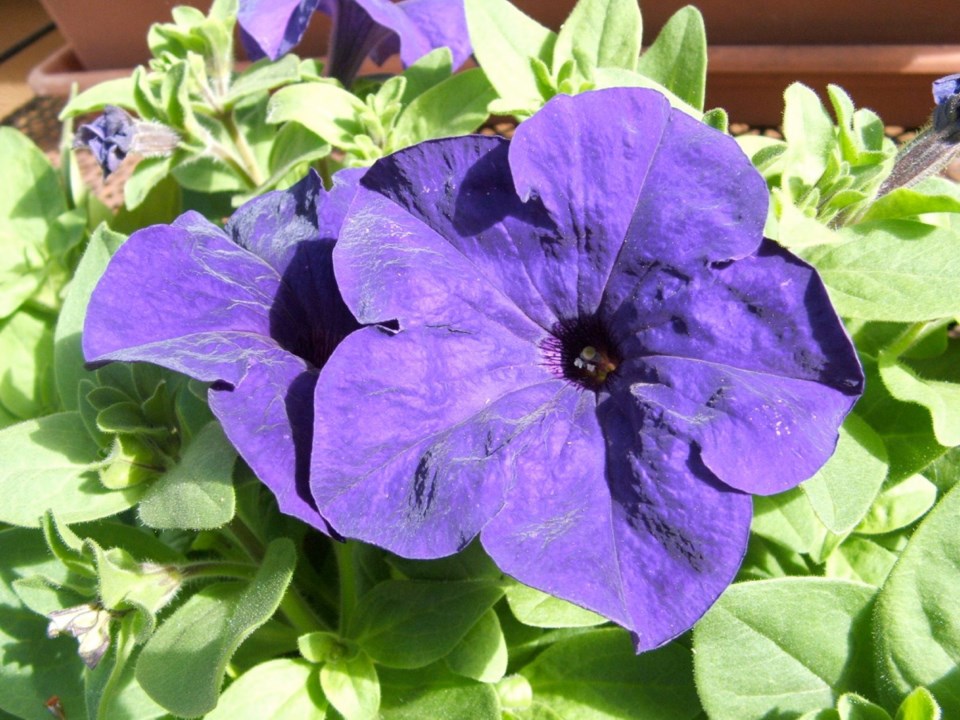Dear Helen: I’m looking for a strongly fragrant petunia for growing on my deck, next to the doorway into the house. I’ve heard ‘Evening Scentsation’ is it. Your opinion?
C.B.
Evening Scentsation is a lovely spreading petunia in gorgeous indigo blue with a satiny sheen. The sweet fragrance is most pronounced in the evening. Even more strongly fragrant, at least in my experience, is Blue Storm, a compact plant with deep blue, velvety flowers. Both petunias have done wonderfully well in elevated bowl-shaped planters on my patio. T&T Seeds lists both.
Dear Helen: I appreciated your explanation in a recent column of the different management methods for summer-bearing and “everbearing” raspberries. Now could you do the same for strawberries by describing the precise differences between June-bearing and “everbearing” types?
L.F.
June-bearing strawberries produce a large crop of berries from late spring into early summer. The berries tend to be larger than everbearing types. Because the plants are so productive during their concentrated harvesting period, they are the preferred choice for people wanting to use them for making jam and other preserves.
Strawberries in the “everbearing” category fall into two types. Day-neutral berries produce a main crop in June and small followup pickings through the summer except during very hot weather. The rest bear one crop in June and another, smaller one later in the summer.
Dear Helen: I’ve become interested in the Egyptian “walking” onion, though I don’t know a lot about it. Do you know of a source for plants or bulbs?
N.W.
Richters Herbs (richters.com) lists both plants and bulbs. The bulbs are shipped for early fall planting.
This unusual onion is a perennial plant that produces little miniature onions at the top of leaf stalks in the plant’s second year. The little onions, borne in clusters, are called bulblets, “bulbils” or “topsets.”
The topsets are harvested in late summer or early autumn, when they have matured to a coppery colour. Some can be planted, others stored cool and dry for the winter.
If the bulblets are not collected, the weight of the clusters will cause the stems to bend to the ground, where they will plant themselves. This habit is reflected in the “walking” part of the plant’s name. In planting themselves, these onions can “walk” up to 90 cm each year. Other names for the plant are “top” onion, perennial onion, and winter onion. Where the “Egyptian” in Egyptian walking onion comes in nobody seems to know for sure.
Planting can be done at almost any time, but early autumn is considered ideal. The little bulblets will root during the fall and produce green growth in late winter or early spring. Each bulblet planted will divide to emerge as a clump of greens. For that reason the little bulbs are given a space of about 30 cm between them.
Another way to propagate is to dig and divide a clump into single sections for replanting individually.
The entire plant can be used. In late summer and in the fall, some of the plants can be harvested for their shallot-like bases, but take care to leave some plants to regrow and produce topsets the following year. Saved bulblets can be planted every few weeks for a continuous supply of green onions from spring through late autumn. The bulblets can be peeled and fried, or minced raw for flavouring salads, soups and stews. In a raw state they are spicy.
One planting of these onions can ensure that you’ll have them producing greens and topsets in your garden for many years to come.
Garden Events
Seedy in Cobble Hill. Entry is free to a Seedy Saturday event on Saturday, 10 a.m. to 2 p.m. in the Cobble Hill Hall on Watson Ave. in Cobble Hill. The event is greatly expanded this year to include vendors such as Lee Valley Tools, Salt Spring Seeds, Full Circle Seeds, Perennial Ridge Farm, Metchosin Farm and many other excellent suppliers of heritage and organic seeds, vegetable and flower starts, plants and shrubs, bulbs and tubers, mason bees and their houses as well as great local food. Free parking is plentiful and the buildings are wheelchair accessible.
Nanaimo meeting. The Nanaimo Horticultural Society will meet on Saturday at 1 p.m. in First Unitarian Fellowship Hall, 595 Townsite Rd. Isabel Morris will speak about Starting and Growing Vegetables. Prior to the meeting, at 12 p.m., Judy Hancock will give a photography workshop. More information at 250-758-6783.



